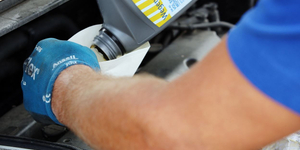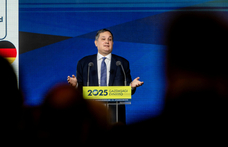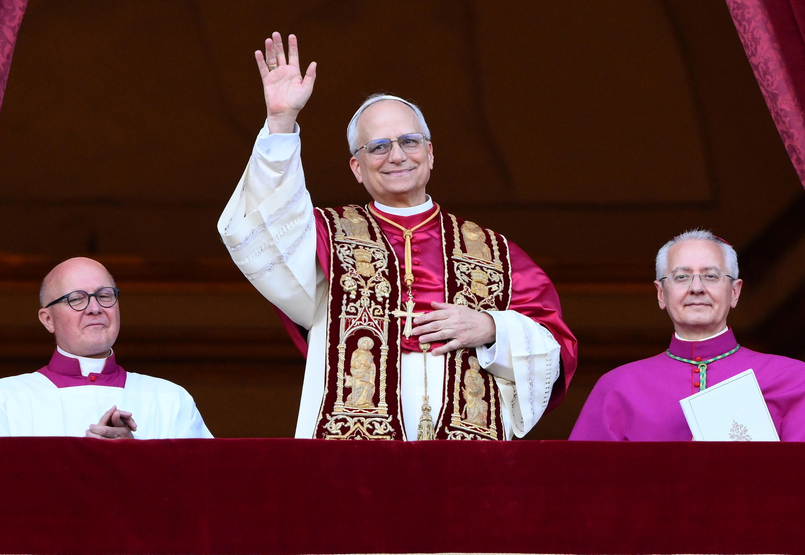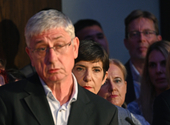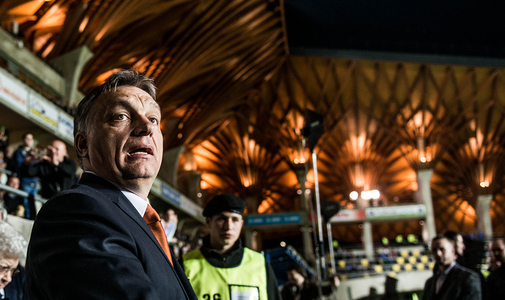Hernadi: "Mol does not wish to renationalise itself"
If Mol's management were interested only in its own short-term interests, it would support OMV's buy-out offer, according to Zsolt Hernadi, the company's 47-year-old chairman and CEO.
hvg.hu: Did the the civil protest action at the beginning of August have any effect? Following release of pollutants into the Raba and OMV's attempt to buy Mol, some people boycotted OMV filling stations. Did Mol support this boycott?
L.H.: We sold a bit more petrol and diesel in August than in June, and sales of fuel cards also rose slightly. That makes it a typical summer season. As a private individual, I understand the action, because Raba is the only river in Hungary suitable for wild-water rowing. But OMV's attempt to buy Mol and pollution are two different issues. We would never support calls for a boycott of a commercial rival.
hvg.hu: It is assumed that OMV took a look at Mol either in order better to stand up to the Russian energy companies or to sell the company on to them. What's your view?
L.H.: At least we can agree that OMV is not interested in Mol in order to create mutual benefits for both countries. A bigger company is not automatically a more efficient one. When buying something, you have to look at what will make a company better, and not what will make it bigger. And we're certain that EU competition authorities would impose conditions for such an acquisition which would disadvantage not just Mol's shareholders but also its employees and the whole Hungarian population. If Mol were a subsidiary of OMV, Vienna would decide how much would be spent in Hungary and the rest of the CEE region on investments and development. If Mol's shares were withdrawn from the stock exchange, it would leave not just a large number of local market analysts unemployed, but many law firms, auditors and other suppliers would have to make redundancies. It would be a backwards step for Mol, if OMV, which is one third owned by the Austrian government, gained influence over Mol, since it would be less concerned with what happened in Hungary and Slovakia when it came to strategically important investments. None of the cosmetic tricks usually employed, like changing the company's name or listing its shares on the Budapest Stock Exchange, would change this fundamental fact.
hvg.hu: So why have you been discussing cooperation deals with OMV for years? Is it true that there was talk earlier this year of swapping shares and supervisory board members?
L.H.: Since 2000, when OMV acquired a 10 per cent stake in Mol without informing us in advance, we have occasionally discussed the kinds of things we could cooperate on. There have been some joint actions. In 2002, for example, we were going to buy a majority stake in the Czech Republic's Unipetrol, but the Czech government decided not to seel. When it put it back on the market, OMV had changed its mind, so we set about buying it ourselves. We looked at opportunities for cooperation again a year ago, but we rejected most of the possibilities, primarily because there would have been competition restrictions that would have made them commercially unviable.
hvg.hu: What ideas did you consider?
L.H.: We looked at cooperating in the gas industry and in petrochemicals. Since Mol does not wish to renationalise itself, we are only interested in joint projects, since only these will allow us to create value. We have no interest in gaining a majority holding. On a corporate level, at least, beyond the obstacles I've already mentioned, the two companies' operating cultures would clash. Since Mol's privatisation, we have worked on the principle that every shareholder must be treated equally. At OMV, that's impossible because of the two holding companies that represent the Austrian state. There would have been problems with competition law and security of supply as well.
hvg.hu: What do you mean by the latter?
L.H.: For example, the Austrians would have decided whether it was the Schwechat refinery they sold off, or Mol's refineries in Bratislava and Szazhalombatta.
hvg.hu: Why are you so sure that one of your refineries would have to go if you joined together and not the Schwechat refinery?
L.H.: Because we already asked the EU's competition lawyers, who said that if OMV bought Mol, it would almost certainly be necessary to sell one of the refineries. And, as Wolfgang Ruttenstorfer, OMV's chief executive, said, Schwechat is not for sale. From that you can tell which refinery the Austrians would sell.
hvg.hu: Does the partnership you've been advocating recently rule out acquiring a stake?
L.H.: No. A partnership generally means you jointly devise a commercial idea. Whether this involves taking a stake is secondary. Our acquisition of Slovnaft began as a partnership, and in the end, the Slovak owners decided, with the support of the Slovak government, to sell the majority of the company to Mol.
hvg.hu: Then, Mol was still one quarter owned by the state, just like OMV now.
L.H.: The starting point was different with the Slovaks. They were the ones looking for a partner. They looked at a lot of companies and finally chose Mol. But we had a three-year trial marriage before they finally decided to sell up.
hvg.hu: The Czech Republic's CEZ is also majority-owned by the state, but you still allow it a 10 per cent stake in Mol. Why?
L.H.: CEZ is not a competitor, and owning it does not throw up any competition issues. The Czechs have no wish to influence Mol's strategy and they don't want to force their commercial policies on us. We have no problem with working with state-owned companies, as it happens. We were prepared to work jointly on gas projects with OMV, and in Russia or in Arab countries it's simply impossible for a foreign investor to avoid working with state companies. We are simply trying to avoid this kind of cooperation disadvantaging us.
hvg.hu: Isn't Mol's management opposing OMV's move because you want to hang on to your jobs and continue buying Mol shares at a discount and selling them on the market at a huge profit?
L.H.: The share option scheme comes to an end next year. Apart from that, a board member receives fixed compensation of Ft6-7m a year. The buyer could probably afford to pay this easily if it was enough to win the favour of the board members. Fortunately, of the 11 board members, eight are part-time, meaning they independently represent the interests of shareholders and do not care about what would benefit the management personally. In any case, an acquisition would cause the biggest possible sudden share price jump. If we were only interested in our own short-term interests, we'd be voting to sell.
hvg.hu: You claim to be protecting your shareholders' interests by buying up your own shares to prevent OMV from buying the company. Yet shareholders would seem keen on the idea of an acquisition, as is shown by the way the price rose over the summer.
L.H.: The buy-backs were intended not to defend us against OMV but were motivated by the fact that on 31 March Mol had $836m of free cash, and we have reasonable debt levels. We'll keep buying so long as that's the best financial investment.
hvg.hu: But small shareholders claim you lobbied for a law that would make it harder to buy companies of strategic importance, something that would benefit few company directors, though including you and Sandor Csanyi, who heads OTP Bank and also serves as vice-chairman of Mol...
L.H.: That's not true. The prime minister, like the other parliamentary parties, asked to be briefed on the OMV affair at the end of June. He then looked to see what existing legislation allowed with respect to strategic resources, and to establish whether these were compatible with EU law. He then instructed the relevant ministers to draft a law. They only asked us about matters relevant to energy companies. The proposal would only change things to give the state and shareholders the rights that EU law already gives them. It's just that during the mania that surrounded EU accession, Hungary implemented stricter rules. Companies that produce more than 40 per cent of the EU's GDP enjoy much stronger protection.
KÁROLY CSABAI
L.H.: We sold a bit more petrol and diesel in August than in June, and sales of fuel cards also rose slightly. That makes it a typical summer season. As a private individual, I understand the action, because Raba is the only river in Hungary suitable for wild-water rowing. But OMV's attempt to buy Mol and pollution are two different issues. We would never support calls for a boycott of a commercial rival.
hvg.hu: It is assumed that OMV took a look at Mol either in order better to stand up to the Russian energy companies or to sell the company on to them. What's your view?
L.H.: At least we can agree that OMV is not interested in Mol in order to create mutual benefits for both countries. A bigger company is not automatically a more efficient one. When buying something, you have to look at what will make a company better, and not what will make it bigger. And we're certain that EU competition authorities would impose conditions for such an acquisition which would disadvantage not just Mol's shareholders but also its employees and the whole Hungarian population. If Mol were a subsidiary of OMV, Vienna would decide how much would be spent in Hungary and the rest of the CEE region on investments and development. If Mol's shares were withdrawn from the stock exchange, it would leave not just a large number of local market analysts unemployed, but many law firms, auditors and other suppliers would have to make redundancies. It would be a backwards step for Mol, if OMV, which is one third owned by the Austrian government, gained influence over Mol, since it would be less concerned with what happened in Hungary and Slovakia when it came to strategically important investments. None of the cosmetic tricks usually employed, like changing the company's name or listing its shares on the Budapest Stock Exchange, would change this fundamental fact.
| © Túry Gergely |
hvg.hu: So why have you been discussing cooperation deals with OMV for years? Is it true that there was talk earlier this year of swapping shares and supervisory board members?
L.H.: Since 2000, when OMV acquired a 10 per cent stake in Mol without informing us in advance, we have occasionally discussed the kinds of things we could cooperate on. There have been some joint actions. In 2002, for example, we were going to buy a majority stake in the Czech Republic's Unipetrol, but the Czech government decided not to seel. When it put it back on the market, OMV had changed its mind, so we set about buying it ourselves. We looked at opportunities for cooperation again a year ago, but we rejected most of the possibilities, primarily because there would have been competition restrictions that would have made them commercially unviable.
hvg.hu: What ideas did you consider?
L.H.: We looked at cooperating in the gas industry and in petrochemicals. Since Mol does not wish to renationalise itself, we are only interested in joint projects, since only these will allow us to create value. We have no interest in gaining a majority holding. On a corporate level, at least, beyond the obstacles I've already mentioned, the two companies' operating cultures would clash. Since Mol's privatisation, we have worked on the principle that every shareholder must be treated equally. At OMV, that's impossible because of the two holding companies that represent the Austrian state. There would have been problems with competition law and security of supply as well.
hvg.hu: What do you mean by the latter?
L.H.: For example, the Austrians would have decided whether it was the Schwechat refinery they sold off, or Mol's refineries in Bratislava and Szazhalombatta.
hvg.hu: Why are you so sure that one of your refineries would have to go if you joined together and not the Schwechat refinery?
L.H.: Because we already asked the EU's competition lawyers, who said that if OMV bought Mol, it would almost certainly be necessary to sell one of the refineries. And, as Wolfgang Ruttenstorfer, OMV's chief executive, said, Schwechat is not for sale. From that you can tell which refinery the Austrians would sell.
Second page of our interview (Oldaltörés)
hvg.hu: Does the partnership you've been advocating recently rule out acquiring a stake?
L.H.: No. A partnership generally means you jointly devise a commercial idea. Whether this involves taking a stake is secondary. Our acquisition of Slovnaft began as a partnership, and in the end, the Slovak owners decided, with the support of the Slovak government, to sell the majority of the company to Mol.
© Túry Gergely |
L.H.: The starting point was different with the Slovaks. They were the ones looking for a partner. They looked at a lot of companies and finally chose Mol. But we had a three-year trial marriage before they finally decided to sell up.
hvg.hu: The Czech Republic's CEZ is also majority-owned by the state, but you still allow it a 10 per cent stake in Mol. Why?
L.H.: CEZ is not a competitor, and owning it does not throw up any competition issues. The Czechs have no wish to influence Mol's strategy and they don't want to force their commercial policies on us. We have no problem with working with state-owned companies, as it happens. We were prepared to work jointly on gas projects with OMV, and in Russia or in Arab countries it's simply impossible for a foreign investor to avoid working with state companies. We are simply trying to avoid this kind of cooperation disadvantaging us.
hvg.hu: Isn't Mol's management opposing OMV's move because you want to hang on to your jobs and continue buying Mol shares at a discount and selling them on the market at a huge profit?
L.H.: The share option scheme comes to an end next year. Apart from that, a board member receives fixed compensation of Ft6-7m a year. The buyer could probably afford to pay this easily if it was enough to win the favour of the board members. Fortunately, of the 11 board members, eight are part-time, meaning they independently represent the interests of shareholders and do not care about what would benefit the management personally. In any case, an acquisition would cause the biggest possible sudden share price jump. If we were only interested in our own short-term interests, we'd be voting to sell.
hvg.hu: You claim to be protecting your shareholders' interests by buying up your own shares to prevent OMV from buying the company. Yet shareholders would seem keen on the idea of an acquisition, as is shown by the way the price rose over the summer.
L.H.: The buy-backs were intended not to defend us against OMV but were motivated by the fact that on 31 March Mol had $836m of free cash, and we have reasonable debt levels. We'll keep buying so long as that's the best financial investment.
hvg.hu: But small shareholders claim you lobbied for a law that would make it harder to buy companies of strategic importance, something that would benefit few company directors, though including you and Sandor Csanyi, who heads OTP Bank and also serves as vice-chairman of Mol...
L.H.: That's not true. The prime minister, like the other parliamentary parties, asked to be briefed on the OMV affair at the end of June. He then looked to see what existing legislation allowed with respect to strategic resources, and to establish whether these were compatible with EU law. He then instructed the relevant ministers to draft a law. They only asked us about matters relevant to energy companies. The proposal would only change things to give the state and shareholders the rights that EU law already gives them. It's just that during the mania that surrounded EU accession, Hungary implemented stricter rules. Companies that produce more than 40 per cent of the EU's GDP enjoy much stronger protection.
KÁROLY CSABAI




